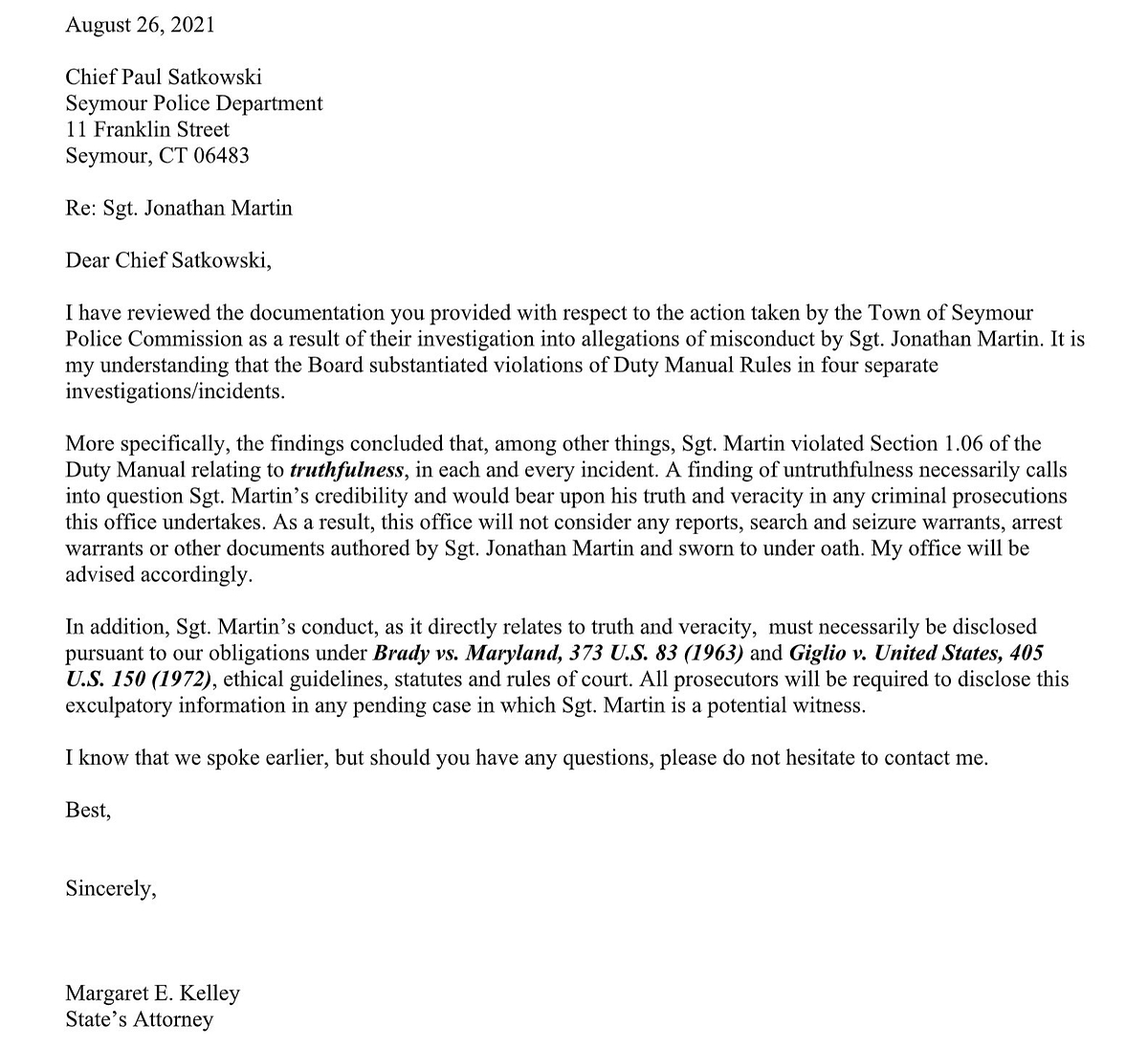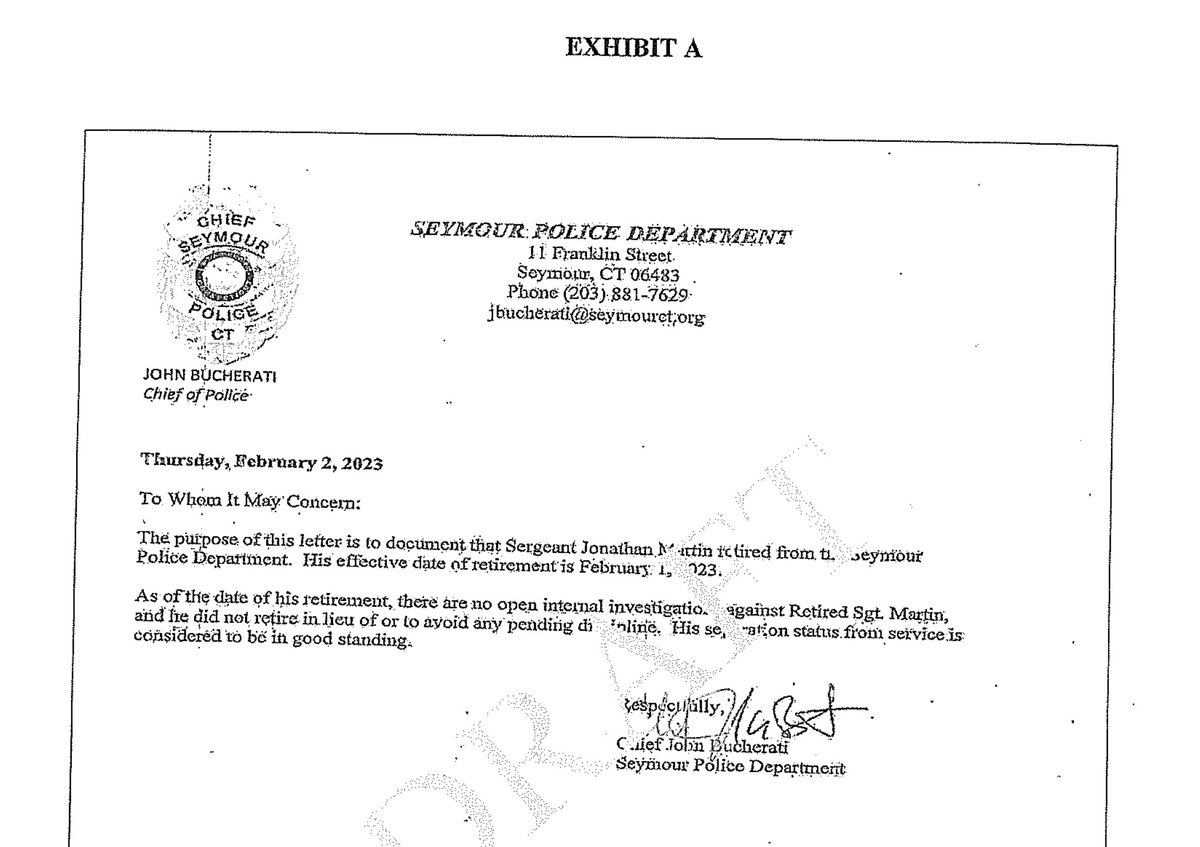
Former Seymour Police Officer Jonathan Martin, in a photo taken from Facebook.
SEYMOUR – A former Seymour police sergeant facing possible decertification by the Connecticut Police Officer Standards and Training Council was allowed to collect roughly a year’s salary and retire in ‘good standing.’
That’s according to a settlement reached between former Seymour Police Sgt. Jonathan Martin and the Town of Seymour. The settlement agreement was approved in a unanimous, bipartisan vote by the Seymour Board of Selectpersons in February.
Martin had been the subject of five internal affairs investigations between 2019 and 2021.
The investigations resulted in Martin being suspended without pay, placed on probation, and demoted to patrolman, among other punishments. He denied the accusations and challenged each decision with union grievances.
Martin, and the Seymour police union’s attorney, Anthony Bento, who represented Martin in his grievances, did not return The Valley Indy’s repeated requests for comment starting in February. The spokesperson for AFSCME Council 4, which represents the Seymour Police Union, declined to comment.
The internal investigations were started by complaints lodged against Martin by fellow police officers – and from a 2020 domestic incident that resulted in his arrest.
The Arrest
Martin was arrested by Waterbury police on Feb. 8, 2020 following a domestic dispute. He was charged with disorderly conduct.
The Seymour police internal report on the incident said Martin and his wife were arguing about a cell phone, and it escalated into a physical struggle. Martin’s wife alleged he was drunk and became suspicious of what was on her phone. He allegedly bent her fingers back to try to get her to unlock the phone. The wife ran out of the house. There were no injuries reported.
Martin denied any wrongdoing.
As a result of the internal Seymour police investigation, the Seymour Police Commission placed Martin on one-year probation; suspended him for six months without pay; demoted him to patrolman, and took away his seniority and eligibility to be promoted.
Seymour Deputy Chief Roberto Rinaldi was told by the Waterbury Superior Court Clerk that the records were sealed, according to the internal affairs report.
Martin was also charged in connection to a domestic dispute in January 2021. The Valley Indy was unable to learn the resolution of that case. Seymour police did not open an internal affairs investigation into it.
IA Reports
The domestic accusations were among a list of wrongdoing alleged against Martin.
The Valley Indy obtained five internal affairs reports from the Seymour Police Department through Freedom of Information requests.
Four of the five internal affairs reports resulted in Martin receiving some type of disciplinary action from the police commission. One of the investigations, which involved Martin allegedly not coming back to the police department to sign a report, was dismissed without disciplinary action, according to Seymour Deputy Police Chief Roberto Rinaldi.
Here is a synopsis of the internal affairs reports against Martin and the disciplinary action that he received:
* Feb. 2019: A fellow officer alleged that Martin, as a supervisor, was creating a hostile work environment, showing other officers in Martin’s “good graces” preferential treatment while giving others undesirable beats; making disparaging comments about an officer, and failing to act in a timely manner involving a domestic violence incident.
Martin denied the officers’ allegations.
The police commission found Martin in violation of truthfulness and behavior unbecoming of a police officer. He was given a five-day suspension without pay and demoted from rank of sergeant to patrolman.
* June 2019: Martin was accused of showing a sexually explicit video containing stripper footage from a bachelor party on his cell phone to several fellow officers, including female officers, while at work. An anonymous letter was sent to then Deputy Police Chief Steve Prajer to investigate the complaint. The report said the author of the letter wished to remain anonymous out of fear of retaliation from Martin, the whistleblower’s supervisor.
The officers who were shown the video said they were in “disbelief and offended” by Martin’s behavior, and that his actions as a supervisor were “inappropriate.”
Martin denied having any knowledge of the video.
As a result of the investigation, the Seymour Police Commission suspended Martin for 12 months without pay and barred him from working as a field training officer for the department.
* February 2020: The domestic dispute, described earlier in this article.
* September 2020: Two Seymour officers filed a complaint against Martin for allegedly interfering with an investigation during a motor vehicle stop while Martin was off duty.
The officers alleged Martin tried to influence the outcome of the officers’ investigation of a motor vehicle stop that allegedly involved a local bartender who Martin said always “take care of us (police officers).”
The woman who was pulled over failed a field sobriety test, and allegedly called Martin while being questioned by the arresting officers.
The complaint alleged the woman had her cell phone partly wedged under her leg and the arresting officer recognized Martin’s name on the phone screen. Martin showed up not long after the woman was pulled over, and allegedly told the arresting officers the woman was “a good girl” who takes care of the police at her place of employment.
The officers alleged that Martin sent them “intimidating and harassing” texts the day after the motor vehicle stop, and asked if they were proud of themselves. The officers expressed concern about future retaliation from Martin.
Martin denied any wrongdoing.
As a result of the investigation, the police commission suspended Martin for nine months without pay.
Other Disciplinary Actions
In addition to the internal affairs reports and the accompanying disciplinary actions, Martin received a number of written warnings and suspensions between 2009 and 2018.
According to internal reports, Martin was given a 10-day suspension for sleeping in his police vehicle in March 2014; he received a five-day suspension in April 2018 for an inappropriate post he made on social media; he received several one-day suspensions for not showing up to work on time, and a written warning for failing to operate a motor vehicle in a safe manner following an on-duty car crash.
Martin was employed with Seymour Police Department from 2007 until the Seymour Board of Police Commissioners voted unanimously to fire him on Oct. 25, 2021.
The reason for Martin’s termination, according to the commission’s meeting minutes, was “based on the fact that he cannot perform the essential duties as a Seymour police officer because he was not truthful, and therefore cannot testify in criminal cases where he is the sole investigator or arresting officer and because of the prolonged criminal restraining order, either of which is sufficient independent of the other for termination of his employment.”
Ex-Chief Wants Him Out Of Law Enforcement
Just a few days prior to Martin’s termination, then Seymour Police Chief Paul Satkowski sent a letter to the state’s Police Officer Standards and Training Council, or POST Council, asking that Martin lose his law enforcement certification.
The Valley Indy obtained a copy of Satkowski’s letter to the council through a Freedom of Information request. In the letter, Satkowski pointed to Martin’s poor job performance in Seymour.
“As Chief of Police, I find Officer Jonathan Martin’s conduct and behavior to be egregious and appalling, which ultimately undermines the public’s trust and confidence in a law enforcement officer,” Satkowski wrote. “Therefore, I am asking the POST Council to take immediate action and decertify Officer Jonathan Martin as a Police Officer in the State of Connecticut.”
In August 2021 Satkowski notified prosecutors in the Milford Judicial District regarding Martin’s history.
Margaret E. Kelley, the State’s Attorney for the Ansonia-Milford Judicial District, wrote Chief Satkowski a letter back, barring Martin from presenting any reports, search and seizure warrants, arrest warrants or any other documents to the court.
Kelley said Martin just could not be trusted to tell the truth.

A letter from Margaret E. Kelley, the State’s Attorney for the Ansonia-Milford Judicial District, to former Seymour Police Chief Paul Satkowski.
“It is my understanding that the Board (of Police Commissioners) substantiated violations of Duty Manual Rules in four separate investigations/incidents,” Kelley wrote. “More specifically, the findings concluded that, among other things, Sgt. Martin violated Section 1.06 of the Duty Manual relating to truthfulness, in each and every incident. A finding of untruthfulness necessarily calls into question Sgt. Martin’s credibility and would bear upon his truth and veracity in any criminal prosecutions this office undertakes. As a result, this office will not consider any reports, search and seizure warrants, arrest warrants or other documents authored by Sgt. Jonathan Martin and sworn to under oath.”

Ex-Chief Satkowski
Martin was to appear for a hearing with POST Council on May 30.
However, Martin, on May 26, 2023, asked to reschedule, according to POST Council officials. A new date has since been scheduled for Nov. 7.
Decertification, if it happens, means that Martin would not be allowed to work as a police officer or security guard in Connecticut.
However, a decertified officer may reapply for certification to the POST Council two years after the date of revocation. No officer has ever been recertified, according to Milford Police Chief Keith Mello, the POST Council chairman.
Click here for a list of decertified officers. There are no officers from the lower Naugatuck Valley (Ansonia-Derby-Seymour-Shelton) on the list.
Good Deal?
Despite the long history of Seymour Police Department internal investigations and a prosecutor saying Martin could not be trusted – the town opted to settle a slew of grievances from Martin, saying it was cheaper to settle than to fight in court.
A settlement was unanimously approved by the Seymour Board of Selectpersons in February.
Some of the terms included:
*Martin is considered to have voluntarily retired from the police department as of Feb. 1, 2023
*Martin was paid $105,000 (as back pay from Oct. 25, 2021 through his retirement date of Feb. 1, 2023)
*A signed letter from the current chief of police stating Martin was able to retire in ‘good standing.’
*All the internal affair investigations against him were closed.
*Martin was issued a retiree identification card.
*Martin agreed to never again seek employment with the Town of Seymour
*Martin agreed to not file lawsuits against the Town of Seymour

This letter from the current chief of police release was written as part of the settlement agreement with the officer.
Seymour First Selectwoman Annmarie Drugonis and Seymour Police Chief John Bucherati said the settlement was in the town’s best interest.
“The town was seeking to minimize the costs associated with litigation,” Bucherati said. “All this happened before I was here, but I’m glad it’s settled and all behind us. It seems to be a reasonable and fair solution.”
Drugonis agreed, saying paying Martin his salary was cheaper than what the town would have spent on lawyers in court.
“He (Martin) got in trouble five times, and he grieved the five times that he was in trouble,” Drugonis said. “It was a mutual agreement, and it was the best for both the town and Martin. It would have cost us more in the long run just in attorney fees than what was in the settlement.”
Seymour Deputy Chief Rinaldi headed up the internal affairs investigations into Martin. He also supported the settlement.
“It could’ve been dragged out through arbitration two or three years, so the town made a wise choice in settling,” Rinaldi said. “I agree that it was for the better of the town. He (Martin) was fairly compensated. But I’m 100 percent confident that we (the town) could have won in court, because we had enough evidence.”
Other Perspectives
The Valley Indy also interviewed two civil rights attorneys and a criminal justice expert, asking them to offer their takes based on the information provided by a reporter.
“This is another example of police unions running municipal governments and police officers leveraging their power to win outrageous amounts of money,” said Ken Krayeske, a lawyer with BBB Attorneys. “There is no other job anywhere else in the United States where an employee could be suspended for more than two years, yet receive back pay and complete protection from termination. Imagine if a parks and rec worker or a public school teacher had this kind of record? Would they be able to negotiate a $105,000 golden handshake? No way.”
Krayeske said Seymour government lost objectivity because they were dealing with a police officer. He called the agreement a “sweetheart deal for an objectively terrible officer” that “demonstrates how local elected officials kowtow to police officers.”
When asked to respond to Krayeske’s comments, Drugonis said Martin initially wanted $300,000 — the town settled for $105,000. She said attorney fees connected to the settlement were “at least $80,000.”
“Further fighting this in court, with having to do depositions and calling in retired employees (to testify), on top of attorney fees, would have cost us more money,” Drugonis said. “The settlement was in the best interest of the town, since we already had almost $80,000 in legal fees. This was a business decision. Moreover, the cost associated with litigating the termination over several years had significant potential to exceed the settlement amount. We don’t know how long this would have taken in a court system with the way the court postpones and attorneys sitting in there all day long. It’s hard to put a price on it.”
Michael Lawlor, a former prosecutor, is a criminal justice professor at the University of New Haven. He spent 24 years as a Democrat in the state House of Representatives, and was Gov. Dannel Malloy’s undersecretary for criminal justice policy and planning in the Office of Policy and Management.
He said the town’s decision to settle with former Officer Martin could make sense from a financial standpoint.
“Generally speaking, it’s not unusual for people to settle cases that they think they might win ultimately, but don’t want to go through the hassle and expense of litigating it for years,” Lawlor said. “At the end of the day, city government has to worry about the taxpayers who pay the bills.”
The agreement between Seymour and former Officer Martin happened about three years after state lawmakers adopted the controversial ‘police accountability’ act. Opponents said the bill protected the public, while opponents said the bill made law enforcement less safe. The Connecticut Post reported in July that there has been a surge of decertification requests since the act was passed.
New Haven-based civil rights lawyer Alex Taubes said the Seymour settlement shows how tough it can be to hold a police officer accountable in Connecticut.
Taubes said that the town probably spent lots of money just to reach the settlement and was understandably hesitant to spend more money in court.
“It definitely seems plausible that it would cost a lot of money to get rid of even the worst bad apple from a police department,” Taubes said. “It may very well have been in the best interest of the town and the cheapest way to get rid of him. I’m encouraged to see they’ve taken action, even though it may be a bit of a sticker shock for some people.”
Taubes said Seymour’s agreement with former Officer Martin should be viewed in a larger context. The issue is bigger than Seymour, he said.
“The city may very well be saving a good amount of money here, and it may be the wisest choice, but it highlights a larger, systemic issue: how to hold officers accountable when they are not upholding their oath to the public. That’s something that needs a great deal more work.”